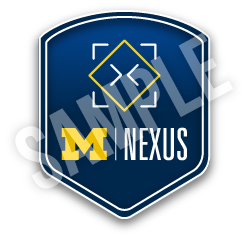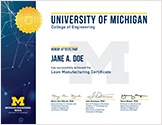SIX SIGMA CERTIFICATIONS
Master Black Belt in Operational Excellence
Home » Professional Education » Six Sigma Certifications » Master Black Belt in Operational Excellence
KEY INFORMATION
Course Dates
Jun 10-14, 2024 &Aug 5-9, 2024
$7550
$7250
Application Deadline
Applications are due May 20, 2024.
You will be notified of the admissions decision within 10 business days of your application.
The class is limited to 9 candidates, so we encourage you to apply well in advance of the deadline.
Please email [email protected] with any questions.
CEUs
9.5
Not ready to commit?
Subscribe for email updates on future offerings and get a program brochure.
SIX SIGMA CERTIFICATIONS
Submit info below and we’ll email you our Six Sigma program brochure.
By submitting this form, you are consenting to receive marketing emails from Nexus. You may unsubscribe at any time.
By clicking 'Get Program Information' you are agreeing to receive emails from Nexus.
Earn your Master Black Belt from the University of Michigan.
This intensive Master Black Belt program will provide you with the core skills in program management and technical problem solving required to be an effective Master Black Belt instructor and continuous improvement leader. Our hyflex delivery format gives students the flexibility to choose either in-person or remote-live participation during this course.
Eligibility for Enrollment
To be accepted into the Master Black Belt program, you must meet the following requirements:
- Earned Black Belt Certification from a recognized source (approved by MBB course instructors)
- Worked as Black Belt for at least two years (unless granted special permission)
- Completed at least 3 significant DMAIC Projects (approved by MBB course instructors)
LEARNING OBJECTIVES
- Identify process improvement opportunities for process owners and Six Sigma belts
- Develop ability to teach Lean Six Sigma statistical analysis tools and methods
- Develop a deeper knowledge of the theory and key concepts of the Lean Six Sigma Body of Knowledge
- Develop advanced data collection plans and design experiments to test hypotheses
- Assess the effectiveness of a process improvement program
- Apply project management skills toward process improvement projects and Lean Six Sigma program deployment
- Integrate statistical analysis tools, software, and problem solving methodologies
- Coach and mentor others on the application of Lean Six Sigma methods
PROGRAM OVERVIEW
This unique program starts with a one-week classroom session in Ann Arbor, or remote-live via Zoom, followed by a second classroom session around eight weeks later. Between the two classroom sessions, you must complete 8 online modules with exercises.
You will begin the Master Black Belt certification process when you demonstrate your teaching skills with a final presentation. Upon successful completion of this session, you must take a certification exam. You will then have six months to develop and present a portfolio for final certification.
A core competency of a Master Black Belt is the ability to manage a continuous improvement program. This course will examine various deployment strategies and provide a roadmap for developing an appropriate deployment strategy to drive change through an organization. We discuss ways to work with company leadership to establish and sustain a culture of continuous improvement.
As subject matter experts, MBBs also must possess a deeper understanding of Lean Six Sigma Green/Black Belt tools as well as be competent using more advanced techniques. This course builds upon the rigorous University of Michigan Black Belt curriculum, going deeper into the following topic areas:
- Advanced Lean Productivity Modeling and Analysis
- Advanced Statistical Process Control (SPC)
- Advanced Process Capability
- Desirability Index for Multiple Requirements
- Advanced Measurement Systems Analysis
- Advanced Hypothesis Testing (Bartlett/Levene Test, Post Hoc Mean Comparisons)
- Categorical Data Analysis Methods (Measures of Association)
- Advance Regression / General Linear Model
- Advanced Design of Experiments (Fold Over Fractional Designs, RSM, Taguchi DOE)
- Introduction to Time Series Analysis and Forecasting
- Overview of Design for Six Sigma
- Reliability Analysis
- Survey Methods and Analysis
- Advanced Power and Sample Size Planning
Another important, though often underappreciated skill, is teaching effectiveness, coaching, and mentoring. The University of Michigan has significant experience teaching and fostering adult learning. Throughout this course, we will work with you to improve your capabilities to design instructional material, prepare for teaching and potential student questions, and explore different ways to effectively teach Black Belt level content. In doing so, we recognize that there is no single best instruction method. Thus, we will discuss different learning styles and present a range of methods to help you develop the right approach for your organization.
During the course, you will be required to deliver three course lectures. You will also be expected to lead a student exercise review session and classroom simulation. During these activities, you will be reviewed by Lean Six Sigma Professional Trainers and instructional design professionals.
Another key role for MBBs is coaching and mentoring Lean Six Sigma projects and continuous improvement events such as Kaizen Events. Many Green/Black projects must overcome challenges such as team member conflicts, scope creep, non-supportive managers, and lack of data availability, so MBBs must be able to effectively guide resources through these non-technical issues. Throughout this course, we will discuss various scenarios and explore different strategies to address these challenges. Among these is to help you recognize the difference between providing guidance for Green/Black Belts versus solving the problem for them. Here, Toyota Kata provides a useful framework for establishing a desired target condition and vision as well as guidelines to effectively coach and engage resources toward a solution.
Of course, mentoring involves more than just dealing with Green/Black Belt resources. MBBs must provide mentoring for managers and non-belt employees to help them see the need for continuous improvement projects and understand the benefits of taking a comprehensive data-drive approach.
Effective MBBs also must have a solid foundation in project management skills including an understanding of how to lead and teach others to lead knowledge-based projects. In Lean Six Sigma problem solving, the solution and sometimes even the project goal often are unknown at project start. As such, DMAIC project management requirements a deeper understanding of adaptive project managements techniques versus a more traditional Project Management approach.
Course Schedule
Prepare Black Belt Project Presentation
Each participant will be allotted 15-20 minutes on the first day of class to present a continuous improvement project from their past work experience. The purpose is to share your experiences with your classmates and also to provide an initial assessment of your teaching and presentation skills.
Prepare for Black Belt Lecture Teach Back
The MBB instructional team will assign you a topic from the Black Belt curriculum for you to teach. For this first session, we want you to prepare and do your best, but we do not expect you to master all the details.
Online Learning Style Survey, Statistics Review, and Optional Basic Minitab Review
Day 1: Course Overview and Teaching Skills Development
- Student Black Belt Presentations
- Creating Effective Presentations
- Learning Styles
- Effective Teaching Strategies
Day 2: Teaching Skills Development
- Statistics Review/Hypothesis Tests
- Student Teaching and Feedback
- Understanding Variable SPC Charts with Minitab exercise
Day 3: Measure Phase – Advanced Statistical Process Control and Measurement Systems
- Time Weighted SPC Charts: CUSUM and EWMA Charts with Minitab exercise
- Student Teaching and Feedback
- Advanced Measurement Systems Analysis (Destructive Testing, MSA Using Two Factor ANOVA)
Day 4: Measure Phase – Measurement Systems Analysis/ Case Study Review
- Student Teaching and Feedback
- Advanced Topics in Process Capability
- Desirability Index: Multiple Requirements
Day 5: DMAIC Project Management
- Project Initiating and Planning
- Project Communication Tools
- Communication Effectiveness Strategies
- Six Sigma Deployment Strategies
Complete sixteen online modules with exercises at your own pace between the two classroom sessions (~20 hours). Module topics include:
- Time Series Models and Forecasting
- Reliability Testing – Single Component (Reliability Concepts, Bath Tub Curve,
- Reliability Distribution Fitting, Reliability Analysis)
- System Reliability (Series, Parallel, k-choose-n redundancy) and Reliability Countermeasures
- Introduction to Sample Size Planning (Single Statistic, Margin of Error, Coefficient of Variation)
- Power and Sample Size Planning Estimates for Hypothesis Tests
- Survey Methods and Analysis Tools
- Project Management – Project Scheduling and Simulation
- Project Management – Critical Chain Project Management
- Project Management – Project Execution and Monitoring (Earned Value, SPI, CPI)
- Project Management – Human Resource Management
Day 1: Teaching Skills, Sample Size Planning, and Hypothesis Testing
- Student Teaching and Feedback
- Advanced Topics in Hypothesis Testing
- Measures of Association
Day 2: Teaching Skills and Advanced Regression Techniques
- Student Teaching and Feedback
- Multiple Regression and Binary Logistic Regression Minitab exercises
- Complex Regression Models
- General Linear Models (GLM)
Day 3: Teaching Skills / Advanced Design of Experiments
- Student Teaching and Feedback
- Advanced Factorial Designs
- Advanced Fractional Factorial DOE Concepts
Day 4: Advanced Design of Experiments / RSM / Multi-Factor Experiments/Taguchi
- Response Surface Methodology (RSM)
- Central Composite Design (CCD)
- Multi-Response Optimization based on Desirability Index
- Introduction to Taguchi DOE
- Tolerance Analysis and Simulation
Day 5: Project Mentoring
- Effective Mentoring Strategies and Challenges
- Overview of Mentoring and A3 Process (Toyota Kata)
- Mentoring – Champions and Process Owners vs. Green Belt/Black Belt
You will demonstrate your teaching skills via WebEx with a final presentation. This can also be done live.
You will take an online exam to demonstrate your Master Black Belt knowledge.
You will have six months to compile and submit a project portfolio for review.
Master Black Belt Certification
A Master Black Belt in Operational Excellence certificate from the University of Michigan College of Engineering will be awarded upon successfully meeting the following requirements:
- Successfully complete the pre-course assignment
- Participate in all course training days and successfully complete all remote-live and self-paced online exercises and case studies
- Successfully prepare and deliver at least two training modules from Black Belt Course Material (modules to be selected for each candidate by MBB Course Instructors)
- Meet all progress improvement objectives identified in weekly evaluations by MBB Instructors
- Obtain an 80% or above on MBB Certification Exam
- Successfully mentor at least three Green or Black Belt candidates through their projects
- Provide evidence of teaching effectiveness (e.g., teaching evaluation from a course taught or from a simulated instructional event at the University)
Software Requirements
The assignment exercises and case studies involve the extensive use of Minitab (not Minitab Express) Statistical Software for analysis. Lectures and assignments are developed for Minitab or equivalent software (SPSS, STAT SOFT, SAS).
If your organization does not offer Minitab please email [email protected] and Nexus will help provide access for this course.
1. Install VMWare Fusion for Mac. Download: https://caenfaq.engin.umich.edu/vmap/what-is-vmap
2. Create a Windows Virtual machine using VMWare Fusion.
3. Install Minitab (Full version) inside the newly created Virtual Windows machine.
Six Sigma Content Subscription
Interested in maintaining access to course materials after you earn your certification? Purchase a 1-year Six Sigma Content Subscription and retain access to your Canvas account.
INSTRUCTIONAL TEAM

Pat Hammett, PhD
- Lead Faculty, Six Sigma Programs
- Associate Chair of Masters Education, Integrative Systems + Design
- Lecturer, College of Engineering

Don Lynch, PhD
- Instructor, Nexus
- Vice President of Quality, Strategy, and Transformation, SKF USA Inc.



